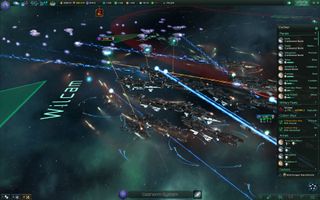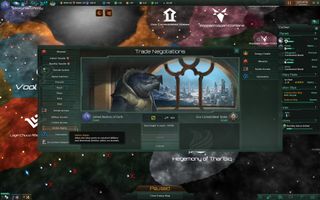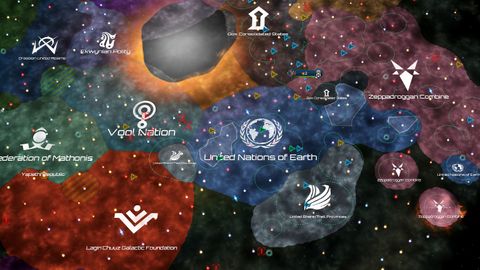Our Verdict
The early game promises an instant strategy classic, but Stellaris is unable to maintain that pace.
PC Gamer's got your back
Stellaris's early game is a wondrous thing. You, the ruler of a newly space-faring empire of mammals, avians, fungoids, or any one of a number of other weird, alien lifeforms, are set free to explore and discover the galaxy. It's mysterious and alluring. You select your science ship and send it off to neighbouring stars, scanning each to discover new life and new civilisations. These are the voyages of the USS Spacey McSpaceface.
As you explore you'll find resources to fund your expansion, which can be harvested by building mining stations. You'll find anomalies, which can be researched to uncover new technologies and trigger quests. You'll meet other species, often friendly but sometimes not. And, when you're not venturing into the unknown, you'll look after the needs of your home planet, constructing buildings for your citizens to work. Sid Meier once called a strategy game a series of interesting decisions, and Stellaris's opening hours are packed full of them.
That Stellaris isn't turn-based creates a fluidity to the action. As with Paradox's previous grand strategies—such as Europa Universalis IV or Crusader Kings II—Stellaris moves in real time, but with the option to pause, slow or fast forward. Rarely in the early game did I feel comfortable speeding up the simulation.
Paradox has a reputation for creating impenetrable systems. Before Stellaris, the studio's most accessible game was Crusader Kings II – a medieval soap opera that nonetheless required a basic knowledge of feudal politics to effectively play. Historical quirks aside, though, these games rarely require complex interactions. With Stellaris, the same holds true. The difference here is the presentation and UI, which work overtime to make things easy to parse. I never felt like I was fighting with the interface. All the major interactions are only ever a single click away.
Thanks to the slick interface, you're free to concentrate on the personality of your empire—roleplaying as peaceful explorers, militaristic zealots, reluctant xenophobes, or many other options available from the trait lines offered during faction creation. Different traits offer bonuses and penalties that inform your decisions, and in some instances restrict your options. Only collectivists can enslave their populations, while fanatic individualists can't prohibit migration.
Your empire's style extends beyond their personality and look. You can build ships, using a simple module system to equip weapons, armour, shields and power cells. You can also assign specific scientists, planetary governors and research admirals, each with their own traits that provide bonuses or, in certain situations, debuffs. In one instance, I was informed that my scientist had developed a habit for substance abuse, significantly cutting their life expectancy. While purely a mathematical penalty, it's presented in such away that adds texture to the story of my empire.

Scientific research also has a random element. Rather than a visible tech tree, each research branch—biology, physics and engineering—offers three potential research options. The tech tree is there, but it's not fixed. Develop an early laser weapon, and your next set of options may present the next tier, or may offer three entirely different options. At times it can feel arbitrary, but it's an effective way of forcing you improvisation. And sometimes you're jumped up the tech tree—offered special, rare research opportunities that can give you a significant advantage.
As you continue to expand and explore, you stumble across rival empires. Eventually there's a tipping point, as your knowledge of the galaxy expands to include its major players. The basic shape of galactic politics begins to reveal itself, and exploration gives way to diplomacy and conquest. Unfortunately, this point signals a major shift in Stellaris's pace. That unrelenting sequence of moment-to-moment choice and consequence instead becomes languid and restrictive.
Maybe it's my own lack of imagination, but I can't see a route to victory that doesn't involve force. The two victory conditions are owning 40% of the galaxy's colonisable worlds or subjugating all of its empires. The galaxy is a crowded place, and so both require military action. As the citizens of my avian empire would say: you can't make a space omelette without breaking a few space eggs. Embracing aggression, I settled into a rhythm of declaring war, taking some territory, and appeasing the conquered planets in time for the next big conflict. It created a mid-game of peaks and troughs, with sudden bursts of action punctuating long years of economic and military growth.
To an extent I applaud Stellaris for not including science or culture victories—win states in which the entire galaxy stops to recognise your insurmountable greatness. But, while contrived, such victory conditions are inelegant solutions to a problem Stellaris doesn't resolve. 4X games aren't endless, and so it's good to provide endings that tailor to each specific play style.

Stellaris isn't just a 4X, though. It's as much a grand strategy, a genre that favours a more sandbox style of campaign. Games such as Europa Universalis 4 or Crusader Kings 2 don't have an obvious victory to strive for. They're alternate history fan fiction, in which the story emerges from both your successes and failures along the way. Ultimately, Stellaris sits awkwardly between the two styles. It does have specific, measurable victory states, but they heavily favour a certain type of play.
A consequence of all this is that diplomacy feels rather lightweight. Yes, deals are made and pledges signed—migration access, which lets populations freely move between two empires, is a particularly nice touch. But, in my experience, the galaxy trends towards inertia. Once an AI alliance is locked in, they're BFFs for life. This was particularly galling in one instance, when I attempted to court two empires in an alliance with each other. Both adored me, and, had they been independant, would have each jumped at the chance to join my alliance. Both refused, though, simply because they were allied to one another. I don't want to cast aspersions on fungoid or molluscoid species, but I, a human, can imagine a pretty obvious solution.
Nevertheless, a galactic standoff between small, rival alliances and federations has the potential to be exciting. Unfortunately, it wasn't. In an effort to shake up the end game, Stellaris can trigger one of a number of galactic crises—in my case an external peril that threatened to engulf the entire galaxy. For a while, it seemed serious. This new faction—the Unbidden—was expanding at an alarming rate, wiping out a number of existing empires. Their growth stopped just as suddenly, but their continued existence negated any aggression from the AI empires.
The Unbidden's presence gives me a +200 opinion modifier with every empire in the game. This, I suspect, is why alliances are unbreakable—had I been able, I could conceivably now ally with the entire galaxy. The opinion buff has another, more pernicious effect. Each empire I attack remains cordial with me after peace is declared. I'm acting like a colossal jerk, and nobody dares raise a finger, let alone a fleet. The same is true of relationships between other empires. It's been decades since an AI player last declared a war.

The solution, I suspect, is to remove the threat by defeating the Unbidden. That in itself is no easy task. They appeared on the opposite side of the galaxy, surrounded by empires that I don't—and can't—forge an alliance with. The diplomacy trade screen lets you negotiate for the right to send military ships through another player's territory. That would work, but only empires you share a border with will ever agree to such a deal. Fair enough, perhaps, but I was negotiating with an empire that bordered my ally. I had a direct, legal route to them, but the result was still the same.
Eventually I took the only path available to me: declaring war and taking the territory for myself. Now I can defeat the Unbidden, something I must do alone. There's no way to coordinate an attack with other AI players, even against a mutual threat. I can't even formally declare war with the Unbidden, thus dragging my allies into the conflict. Their fate rests solely on my shoulders. It feels weird to expend so much effort just so other empires will hate me again, but the alternative is a galaxy trapped in the status quo.
I'm disappointed, because Stellaris's first few hours hinted at a smart, scintillating reinvention of the 4X. The early game is packed full of personality, but it's squandered as the hours roll on. Maybe I had a particularly bad late game experience—the random nature of each campaign suggests many potential outcomes. But the glacial pace feels intentional, and the long periods of inaction bring other limitations to the fore. How most research is purely a stat boost, with only a scant few technologies progressing the story in fun, inventive ways. How presidential candidates have so few mandates, often cycling between just two basic objectives. How espionage is an obvious omission, especially when effective combat is so dependant on information.
None of which is to say Stellaris is a bad game, just an inconsistent one. Given Paradox's history, I hope upcoming patches and expansions can fill in the gaps, and smooth out the omissions and weird quirks of diplomacy. I desperately want the full game to match the promise of its opening. Tweaked in the right way, Stellaris has a chance to become an enduring classic. Right now, it doesn't meet its full potential.
The early game promises an instant strategy classic, but Stellaris is unable to maintain that pace.

Phil has been writing for PC Gamer for nearly a decade, starting out as a freelance writer covering everything from free games to MMOs. He eventually joined full-time as a news writer, before moving to the magazine to review immersive sims, RPGs and Hitman games. Now he leads PC Gamer's UK team, but still sometimes finds the time to write about his ongoing obsessions with Destiny 2, GTA Online and Apex Legends. When he's not levelling up battle passes, he's checking out the latest tactics game or dipping back into Guild Wars 2. He's largely responsible for the whole Tub Geralt thing, but still isn't sorry.

